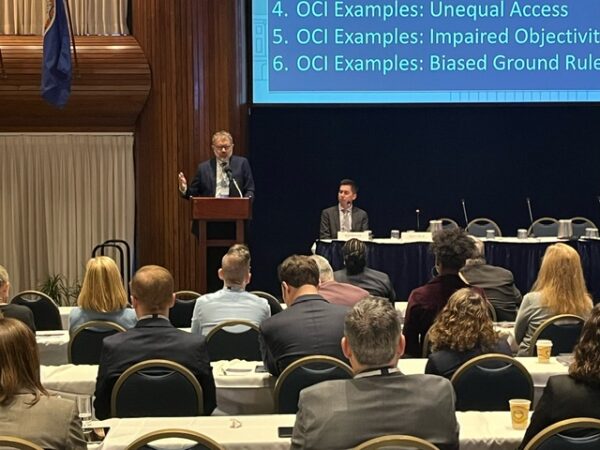Often contractors will protest an award, then learn that the contract at issue was cancelled by the government due to corrective action. When that occurs, contractors of course feel as if their concerns were not resolved, or the protested other parties were let off the proverbial hook. The U.S. Court of Federal Claims recently explained that if that happens, there is no procurement left to protest, even if there are related research and development projects or actions continuing within the Government.
Continue readingTag Archives: COFC
Thank You, COFC Judicial Conference
I recently returned from the 35th Annual Judicial Conference for the Court of Federal Claims. I wanted to send a hearty thanks to all of the organizers of the conference, especially Judge Tapp! It was a great opportunity presenting on the topic of Private Conflicts: How the New Private Sector OCI Rules Could Impact Federal Procurement. I also thoroughly enjoyed the other presentations at the conference.
For those looking for more information on this topic, here are some resources for you:
- Original blog post: New OCI Law Focuses on Private Sector Contracts, More Examples, More Procedures
- Contracting While Impaired: Court Rejects Overbroad Finding of OCI Based on Impaired Objectivity
- Apparent Conflict: Appearance of Impropriety Enough to Exclude a Contractor from Federal Contract
- 2024 Blog Post: Predictions: Upcoming Rules on Conflicts of Interest

35th Annual Judicial Conference – U.S. Court of Federal Claims in Washington DC
I will be presenting at the 35th Annual Judicial Conference in Washington, D.C., on October 23. This prestigious event gathers legal professionals, judges, and scholars from across the country to discuss the latest developments in the judiciary and legal system.
It’s definitely an honor to be speaking at the 35th Annual Judicial Conference for the Court of Federal Claims. My topic is: Private Conflicts: How the New Private Sector OCI Rules Could Impact Federal Procurement.
Hope to see you there! You can read more about this event and the speakers giving presentations at this link.
Federal Circuit Decision: Slightly Opens Protest Door to Non-Offerors
Lately, we’ve seen a boom in protests being brought to the United States Court of Federal Claims (COFC) in lieu of protests brought at the Government Accountability Office (GAO). And it appears that the recent decision in Percipient.AI, Inc. v. United States, 2023-1970 (June 7, 2024) may have just set the course for even more. But the case here didn’t start with an offeror under a solicitation. Instead, it was brought by a commercial software company, Percipient.AI, Inc. (Percipient), who challenged the government’s acquisition of custom software at the Court of Federal Claims and then landed right in the lap of United States Court of Appeals for the Federal Circuit (Federal Circuit).
Continue readingApparent Conflict: Appearance of Impropriety Enough to Exclude a Contractor from Federal Contract
When a government employee moves from a federal agency to a private contractor, this sort of revolving door can lead to concerns that contractor hiring the ex-agency employee is getting special treatment. To avoid this concern, the ex-agency will sometimes bar the contractor from competing. In a recent case, the Navy did just that and a court had to review if the Navy made a reasonable decision.
Continue readingCOFC: Lapsed SAM Registration During Proposal Evaluations Makes Offeror Ineligible for Award
It’s a tale as old as time, and I’m not talking about “Beauty and the Beast.” I’m talking about an offeror who failed to comply with the registration requirements in FAR 52.204-7. What’s FAR 52.204-7? It’s the FAR provision that requires, among other things, all offerors to be registered in the System for Award Management, or SAM as it is better known. And, as we have seen many times before, there is no way around this rule. Often, failure to be registered in SAM limits an offeror’s eligibility before award is made, making the offeror ineligible for award. However, this time, it affected the award that had already been made, resulting in the court entering a preliminary injunction against the government continuing with its original award.
Continue readingException to the Rule: Evaluating Price at IDIQ Versus Order Level Is a Limited Exception
A recent COFC decision yielded some important insights about government contracting. We already wrote about some joint venture aspects of the decision. But the decision also touched on whether GSA’s solicitation violated federal procurement law by excluding price as an evaluation factor at the indefinite delivery indefinite quantity (IDIQ) level for a procurement.
Continue reading